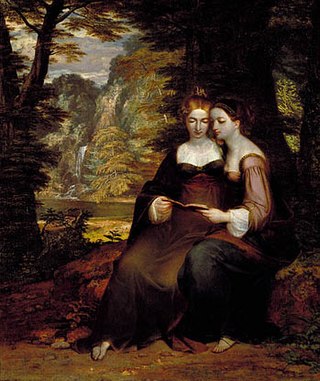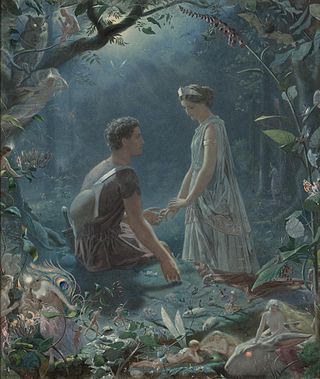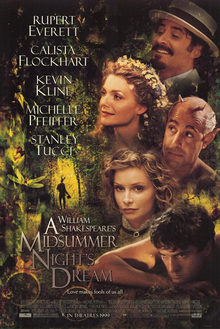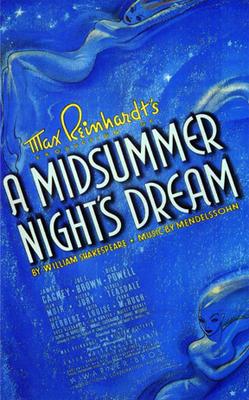Hermia is a fictional character from A Midsummer Night's Dream.
Hermia may also refer to:
- 685 Hermia, an S-type asteroid
- Hermia (Finland), a science park
- Hermia (Cilicia)
Hermia is a fictional character from A Midsummer Night's Dream.
Hermia may also refer to:
Ammonius Hermiae was a Greek philosopher from Alexandria in the eastern Roman empire during Late Antiquity. A Neoplatonist, he was the son of the philosophers Hermias and Aedesia, the brother of Heliodorus of Alexandria and the grandson of Syrianus. Ammonius was a pupil of Proclus in Roman Athens, and taught at Alexandria for most of his life, having obtained a public chair in the 470s.

A Midsummer Night's Dream is a comedy play written by William Shakespeare in about 1595 or 1596. The play is set in Athens, and consists of several subplots that revolve around the marriage of Theseus and Hippolyta. One subplot involves a conflict among four Athenian lovers. Another follows a group of six amateur actors rehearsing the play which they are to perform before the wedding. Both groups find themselves in a forest inhabited by fairies who manipulate the humans and are engaged in their own domestic intrigue. The play is one of Shakespeare's most popular and is widely performed.
Hermione most commonly refers to:
Salamanes Hermias Sozomenos, also known as Sozomen, was a Roman lawyer and historian of the Christian Church.

Helena is one of the four fictional young lovers – the others being Demetrius, Lysander, Hermia – featured in William Shakespeare's play A Midsummer Night's Dream.

Lysander is a fictional character in William Shakespeare's play A Midsummer Night's Dream.
Egeus is a character in A Midsummer Night's Dream, the comedy by William Shakespeare. He is an Athenian who tries to keep his daughter, Hermia, from marrying Lysander. In original performances, the actor for his role probably played the part of Philostrate as well. Egeus wants Hermia to marry Demetrius.

Hermia is a fictional character from Shakespeare's play, A Midsummer Night's Dream. She is a girl of ancient Athens named for Hermes, the Greek god of trade.

Barbe-bleue is an opéra bouffe, or operetta, in three acts by Jacques Offenbach to a French libretto by Henri Meilhac and Ludovic Halévy based on Charles Perrault's 1697 story.

A Midsummer Night's Dream is a 1999 fantasy romantic comedy film written, directed and co-produced by Michael Hoffman, based on the 1600 play of the same name by William Shakespeare. The ensemble cast features Kevin Kline as Bottom, Michelle Pfeiffer and Rupert Everett as Titania and Oberon, Stanley Tucci as Puck, and Calista Flockhart, Anna Friel, Christian Bale, and Dominic West as the four lovers.

A Midsummer Night's Dream is a 1935 American romantic comedy fantasy film of William Shakespeare's play, directed by Max Reinhardt and William Dieterle, and starring James Cagney, Mickey Rooney, Olivia de Havilland, Jean Muir, Joe E. Brown, Dick Powell, Ross Alexander, Anita Louise, Victor Jory and Ian Hunter. Produced by Henry Blanke and Hal B. Wallis for Warner Brothers, and adapted by Charles Kenyon and Mary C. McCall Jr. from Reinhardt's Hollywood Bowl production of the previous year, the film is about the events surrounding the marriage of the Duke of Athens, Theseus, and the Queen of the Amazons, Hippolyta. These include the adventures of four young Athenian lovers and a group of six amateur actors, who are controlled and manipulated by the fairies who inhabit the forest in which most of the story is set. The play, which is categorized as a comedy, is one of Shakespeare's most popular works for the stage and is widely performed across the world. Felix Mendelssohn's music was extensively used, as re-orchestrated by Erich Wolfgang Korngold. The ballet sequences featuring the fairies were choreographed by Ballets Russes veteran Bronislava Nijinska.
Hermias is the name of:

Atarneus, also known as Atarna (Ἄταρνα) and Atarneites (Ἀταρνείτης), was an ancient Greek city in the region of Aeolis, Asia Minor. It lies on the mainland opposite the island of Lesbos. It was on the road from Adramyttium to the plain of the Caicus. Its territory was called the Atarneitis.
Hermias of Atarneus was a Greek tyrant of Atarneus, and Aristotle's father-in-law.
Hermias was a Neoplatonist philosopher who was born in Alexandria c. 410 AD. He went to Athens and studied philosophy under Syrianus. He married Aedesia, who was a relative of Syrianus, and who had originally been betrothed to Proclus, but Proclus broke the engagement off after receiving a divine warning. Hermias brought Syrianus' teachings back to Alexandria, where he lectured in the school of Horapollo, receiving an income from the state. He died c. 450 AD, at a time when his children, Ammonius and Heliodorus, were still small. Aedesia, however, continued to receive an income from the state, in order to raise the children, enabling them to become philosophers.
Hermias of Comana is an early martyr commemorated in the Orthodox Church and the Catholic Church. He lived in the 2nd century and was a soldier in the Roman army until he confessed Christ and was tortured. His feast day is 31 May.
Papyrus Oxyrhynchus 120 contains two letters, written in Greek and discovered in Oxyrhynchus. The manuscript was written on papyrus in the form of a sheet. The document was written in the 4th century. Currently it is housed at Haileybury College in Hertford Heath.
Dead Man's Cell Phone is a play by Sarah Ruhl. It explores the paradox of modern technology's ability to both unite and isolate people in the digital age. The play was awarded a Helen Hayes Award for Outstanding New Play.
Demetrius is one of the lovers in William Shakespeare's play A Midsummer Night’s Dream. He is a young man who is engaged to a young woman, Hermia, who is in love with Lysander.

Hermia and Lysander is a watercolor painting created in 1870 by British illustrator and miniature portrait painter John Simmons. Based on a scene from Act II, scene II of William Shakespeare's comedy play A Midsummer Night's Dream, it measures 89 by 74 centimetres.